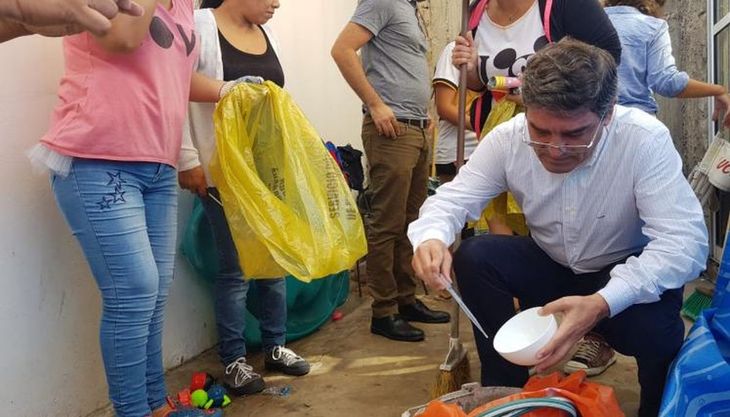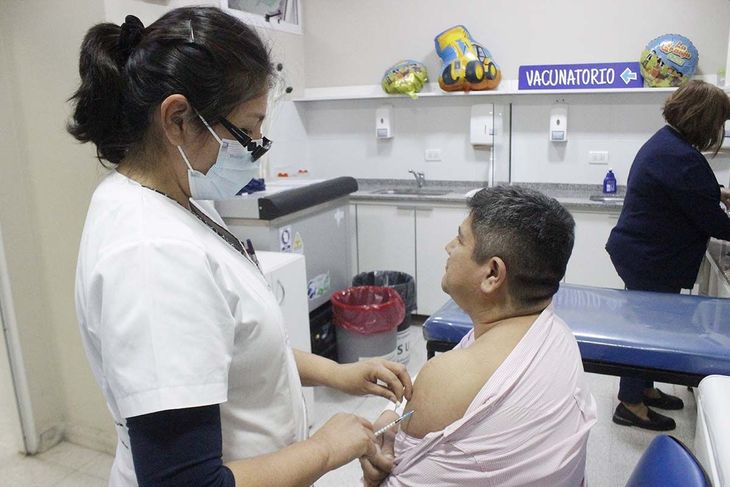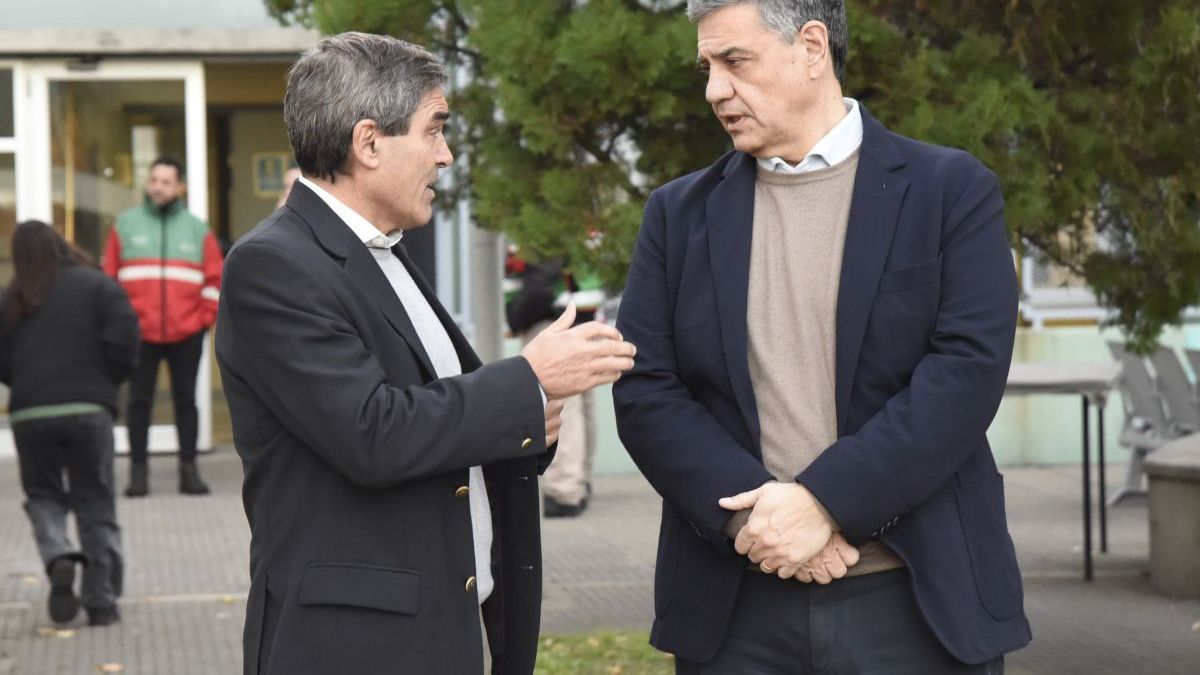The new measures will be announced by the head of the City Government, Jorge Macriand the local Minister of Health, Fernan Quirosin a joint press conference from the Buenos Aires Government headquarters, located in Parque Patricios. Before its launch, Scope had access to the main aspects of the strategy and was able to speak with the authorities to learn about the background of the health policy in this regard.
During this period, operations are carried out to combat and eliminate breeding sites, and residents are called upon to clean up and remove junk, both in their homes and in public buildings, sports centres and elsewhere. To do this, it is recommended to empty the stagnant water and also clean the containers with hard-bristle brushes or, alternatively, use boiling water.
At the same time, the Buenos Aires City Government asks that the inhabitants of the City report the presence of breeding sites. Currently, a “Boti” -similar to the one that handles citizen queries- and a link called “Report Breeding Farm”. In reference to the necessary joint work, Jorge Macri described the need to “build a social contract”.
dengue-climate-change.jpg
Aedes Aegypti, a mosquito capable of transmitting dengue.
The situation is monitored, in particular, by means of “ovitraps” deployed at different strategic points in CABA, the aim of which is to monitor the presence of new eggs. Between July and September, these tests usually yield negative results.
Subsequentlyin the period from October to Decemberthe second stage develops. With the arrival of warm weather, the eggs hatch and adult Aedes aegypti appear. Except for last year, when the early presence of cases led to the start of the epidemic, there is usually no circulation of the virus. By then, theThe Buenos Aires government plans not only to reinforce the operations, but also toa sensor network to strengthen surveillance. When positive cases were found in one of the sensors, an operation was deployed in the area and larvicides were applied in strategic locations.
The third stagemeanwhile, takes place in January. As summer progresses, clocal circulation of the virus begins. Here, fumigation and outbreak control activities are intensified in the homes of the sick to prevent the spread. “The absolute right time to fumigate is when a person appears who has the virus in his blood. At that point, you have to kill all the live mosquitoes around him. You have to make sure that no mosquito bites him so that the spread to other people in the area does not begin,” explained Fernan Quiros.
Descacharreo dengue.jpg

The task of removing waste and cleaning water reservoirs is one of the keys to preventing dengue.
In this regard, he pointed out that “preventive fumigation of the square is of no use; fumigation is useful in stage 3 for the sick person.” “If you have been diagnosed with the disease and you are not part of the public system – because in the public system we go straight away – contact us and we will go to your house to fumigate. In this, society also has to help us because many people do not accept it,” The official added: The operation consists of fumigating the house and everything around it. In addition, a door-to-door survey is conducted and, for every feverish person identified, the area around them is blocked.
The fourth and final stage takes place between February and June, and is the time of greatest circulation of the virus. In this regard, the Buenos Aires Minister of Health commented that at that time “there is some justification for more massive fumigations.” On this item, he said that “preventive fumigation of public spaces is of no use,” since the Aedes aegypti is not present in public spaces: “Killing mosquitoes that do not have the disease is of no use as a preventive measure. You have to go and find the mosquito that is sick.” By then, it is planned to establish 4 new Day Hospitals in acute hospitals and strengthen the hydration points in the CeSACs, as well as increase the response capacity of the fever units to more than 3,000 consultations per day.
What will happen with vaccination in the City?
Another key issue is what will happen with dengue vaccination. The City announced that it will initially purchase 60,000 vaccines “in response to increasing concerns” and “so as not to miss the appropriate time window.” The vaccination plan will be developed in a progressive and phased manner, in line with national guidelines. In this sense, it will begin with adolescents aged 15 to 19; then it will gradually advance with young people aged 20 to 29 and, finally, with adults aged 30 to 39.
Starting on September 18, appointments will begin to be granted through the Ministry of Health GCABA website. In total, 12 vaccination centers will be available, distributed in the different neighborhoods of the City, including Hospitals, CeSACS, and extra-hospital posts.
“The national government made the decision to vaccinate starting in the northwest and northeast with boys and girls from 15 to 20 years old. We are going to follow this guideline as we monitor the outbreaks year by year and the scientific knowledge we acquire year by year,” Quirós said. He also raised the issue of concern that last summer more than half of the people who were vaccinated in the district were over 60 years old: “This is an age group for which the vaccine is not indicated, because there is no scientific work that has evaluated the purpose of a vaccine of this type in someone over 60 years of age.”
Dengue vaccine.jpg

At the moment, dengue vaccination is carried out in the NOA and NEA, where the disease is endemic.
In May, the Minister of Health of the Nation, Mario Russopresented the Work Plan for the Comprehensive Approach to Dengue 2024 – 2025, which establishes that at the current time, according to the epidemiological situation, “it is not a vaccine to be incorporated into the National Calendar for all jurisdictions in the country.”
“The targeted vaccination strategy will target people aged 15 to 39 in departments prioritized according to the epidemiological situation. It will begin in stages with the population aged 15 to 19 and will advance in a dynamic, progressive, and staggered manner according to the availability of vaccines and according to the strategies already implemented by the jurisdictions,” the health portfolio stated.
In this regard, Quirós stressed that each district is free to buy vaccines, but that the important thing is “not to break the guidelines of the national strategy.”
He also exemplified that according to studies carried out in Buenos Aires, only 8% of citizens have serology for dengue, unlike what happens in cities in Brazil and Paraguay, which are endemic, where the phenomenon occurs in between 40% and 60% of the population. “This shows that we are a city with some outbreaks, but that it is not an endemic area, where dengue is widely distributed as in other places,” evaluated.
Finally, the minister called for caution and clarified that severe dengue affects 0.1% of patients and that only one in a thousand is admitted. In this regard, he commented that mortality in public systems with high accessibility is “practically zero.” “Most of the deaths in underdeveloped countries are caused by people who seek medical attention too late or who are lost to follow-up. With proper care and treatment, dengue has a mortality rate of practically zero,” he concluded.
According to data from the Ministry of Health of the Nationbetween purposes Between July 2023 and mid-April 2024, 301 deaths from dengue were recorded in Argentina, with a peak of 56,398 cases in week 12 of the year. The epidemic was centered in the north, which was the most affected region. For its part, the World Health Organization (WHO) He warned that the highest number of dengue cases worldwide was recorded last year, with an all-time high of more than 6.5 million and more than 7,300 deaths in 80 countries.
Source: Ambito




